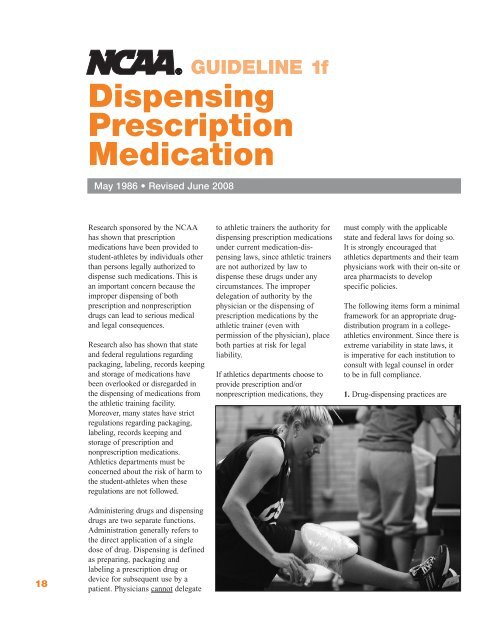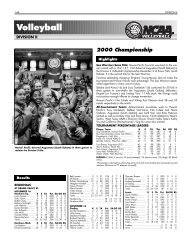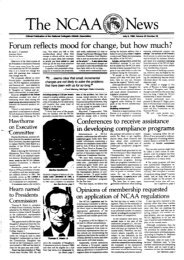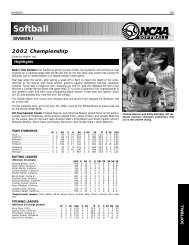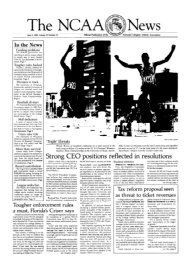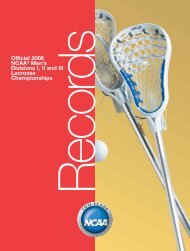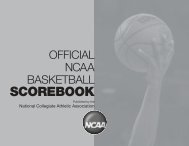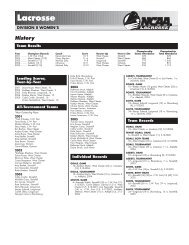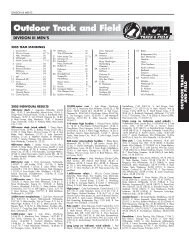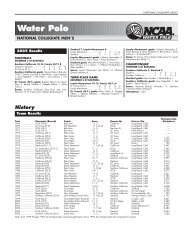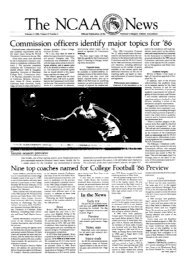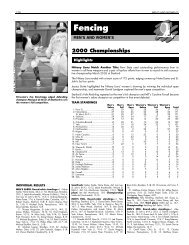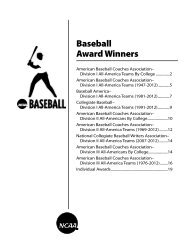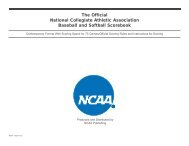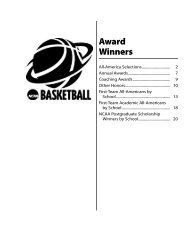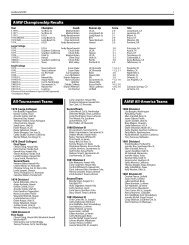Sports Medicine Handbook - NCAA
Sports Medicine Handbook - NCAA
Sports Medicine Handbook - NCAA
Create successful ePaper yourself
Turn your PDF publications into a flip-book with our unique Google optimized e-Paper software.
18<br />
Dispensing<br />
Prescription<br />
Medication<br />
May 1986 • Revised June 2008<br />
Research sponsored by the <strong>NCAA</strong><br />
has shown that prescription<br />
medications have been provided to<br />
student-athletes by individuals other<br />
than persons legally authorized to<br />
dispense such medications. This is<br />
an important concern because the<br />
improper dispensing of both<br />
prescription and nonprescription<br />
drugs can lead to serious medical<br />
and legal consequences.<br />
Research also has shown that state<br />
and federal regulations regarding<br />
packaging, labeling, records keeping<br />
and storage of medications have<br />
been overlooked or disregarded in<br />
the dispensing of medications from<br />
the athletic training facility.<br />
Moreover, many states have strict<br />
regulations regarding packaging,<br />
labeling, records keeping and<br />
storage of prescription and<br />
nonprescription medications.<br />
Athletics departments must be<br />
concerned about the risk of harm to<br />
the student-athletes when these<br />
regulations are not followed.<br />
Administering drugs and dispensing<br />
drugs are two separate functions.<br />
Administration generally refers to<br />
the direct application of a single<br />
dose of drug. Dispensing is defined<br />
as preparing, packaging and<br />
labeling a prescription drug or<br />
device for subsequent use by a<br />
patient. Physicians cannot delegate<br />
GUIDELINE 1f<br />
to athletic trainers the authority for<br />
dispensing prescription medications<br />
under current medication-dispensing<br />
laws, since athletic trainers<br />
are not authorized by law to<br />
dispense these drugs under any<br />
circumstances. The improper<br />
delegation of authority by the<br />
physician or the dispensing of<br />
prescription medications by the<br />
athletic trainer (even with<br />
permission of the physician), place<br />
both parties at risk for legal<br />
liability.<br />
If athletics departments choose to<br />
provide prescription and/or<br />
nonprescription medications, they<br />
must comply with the applicable<br />
state and federal laws for doing so.<br />
It is strongly encouraged that<br />
athletics departments and their team<br />
physicians work with their on-site or<br />
area pharmacists to develop<br />
specific policies.<br />
The following items form a minimal<br />
framework for an appropriate drugdistribution<br />
program in a collegeathletics<br />
environment. Since there is<br />
extreme variability in state laws, it<br />
is imperative for each institution to<br />
consult with legal counsel in order<br />
to be in full compliance.<br />
1. Drug-dispensing practices are


